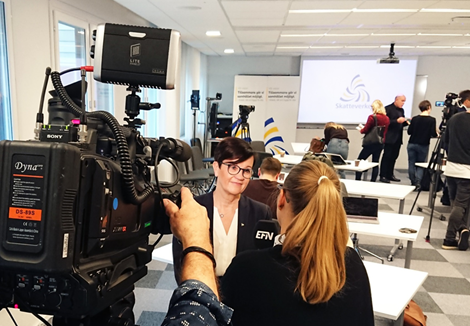One of the main objectives for enforcement in the Swedish Tax Agency (STA) is to strengthen social norms. One way to achieve this is to actively communicate and be transparent about planned audit and control activities. By communicating these in advance, a signal is sent to taxpayers in general that STA are handling tax evasion and non-compliance ‘on their behalf’. It means that they can focus on running their businesses in a context of fair competition. Consequently, it also creates awareness about the planned actions. The objective of this communication is therefore to strengthen their social norm of voluntary compliance and willingness to comply.
The main activity in communicating planned audits and control is an annual Press conference. The conference, which is hosted by the Director-General, consists of presentations by STA experts from different areas. Not all control activities within STA are communicated at the conference, some are taken up in more targeted media initiatives or not at all. The focus is on those activities that have a high priority and are deemed relevant to society, i.e. that has the most potential to strengthen norms. Information about planned audits are often combined with other relevant information such as introduction of new legislation, economic impact on businesses and guidance on how to manage complex taxation issues. Guidance not only assists compliance in the technical sense, but also reinforces the signal that the Tax Administration expects people to want to do the right thing as long as we provide assistance, thereby strengthening social norms.

Press conference hosted by the Swedish Director-General Katrin Westling Palm
These are some of the subjects that has been included in the press conference in recent years:
• Tax evasion in specific areas (e.g. VAT fraud, systematic undeclared work), often combined with their impact on society as a whole including labour crimes and money laundering, even human trafficking.
• International taxation issues, for example the use of information exchange, transfer pricing and the handling of “leaks” such as Panama Papers
• Targeted initiatives in sectors with a high-level of non-compliance (e.g. cleaning, transport, construction). The main target group is compliant taxpayers in those sectors with the message that they should achieve fair competition.
• Society issues (e.g. organised crime, use of false identities for tax or other crimes) – where taxation is just one component of a larger societal problems, often in collaboration with other government agencies such as the Police and the Social Securities Agency
• Areas were SMEs makes errors in their normal running of their businesses, such as benefits, private costs, company cars etc. As most of these errors are common and could be due to complex rules, facts about controls is often combined with information and reference on how to do comply with the rules in the easiest way.
The press conference is followed by in-depth interviews with the STA experts on national media (radio, TV, web etc). Furthermore, reporters often make follow-up articles later on about audit results. Sometimes it influences the media agenda and introduces new subjects into the public debate.
Internal evaluation at the STA has shown that the annual press conference generates a high level of awareness about planned controls. A dedicated media analysis is made after the event which is cross-referenced against the STA’s general surveys on taxpayer confidence (which obviously is influenced by many factors).

